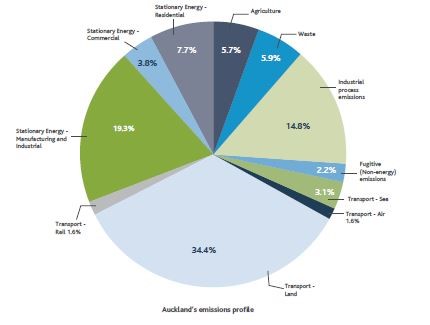The 2015 Climate conference in Paris generated pledges to mitigate greenhouse gas emissions sufficiently to limit global temperature rise to 1.5 degrees. Can we do enough at the local level to achieve that goal?
The C40 Cities Climate Leadership Group (C40) is a network of megacities taking action to reduce greenhouse gas emissions. These cities comprise 500 million people and account for 25% of the world’s GDP. In 2015, Auckland became the 83rd city invited to join C40 and membership will give Auckland global access to 82 like-minded cities who are implementing innovative solutions to the climate challenges affecting us all.
Cities account for 80 per cent of global greenhouse gas (GHG) emissions. Auckland’s vision is to be the world’s most liveable city. Auckland’s Low Carbon 2014 plan1 outlines short and long term goals in transport, energy, built environment, waste management, and forestry that will allow the city to reduce gross GHG emissions by around 5.3 million tonnes.

Auckland’s emission profile (above) shows which sectors need most attention. Land transport is a major emitter and improvements to public transport networks are underway, with significant funding from Auckland Council’s overall budget. Only 10% of Kaipātiki Local Board residents take public transport to work. The Beach Haven project2 used individualised travel plans to transition hundreds from private to public transport. There is potential for more ‘transitioning’ city-wide, as bus and rail services improve.
‘Energy’ was bypassed in Council’s ten year budget even though ‘stationary energy’ generates 30.8% of Auckland’s emissions and the city is New Zealand’s largest industrial centre with industry producing 34.1% of local emissions and aiming to double turnover in five years.3 If reduced emissions in some areas (e.g., transport and waste management) are countered by emission spikes elsewhere (e.g., in industry) then Low Carbon goals are stymied. Without broad-based intervention, Auckland’s emissions could rise 46% by 2025.1
Most of Auckland’s electricity comes from the South Island. Costs are increasing and energy supplies reliant on hydropower are at risk in a warming world. The Council must urgently address local renewable energy, such as solar power, and budget to implement this crucial aspect of its Low Carbon plan.
Waste accounts for just 5.9% of emissions. Better management has reduced emissions, but with 50–60% of food waste still going to landfill, there are still significant gains to be made.
Given intense pressure to increase Auckland’s housing sectors of ‘built environment’, agriculture and forestry must be monitored, especially given current threats to areas of treasured heritage bush (local carbon sinks).
On an individual level your choices can make a difference. For example:4
- One return flight between Auckland and Europe produces 10 metric tonnes of CO2 per passenger.
- New Zealanders emit an average 19.4 metric tonnes of CO2 per person per year (the global average is 4 metric tonnes per person per year).
- To prevent a 2 degree temperature increase requires CO2 emissions below 1 metric tonne per person per year.
On a community level, the upcoming Council and local board elections present opportunities to vote for people committed to environmentally astute policy. Let’s make the most of that chance.
If you are attending any “meet the candidates” meetings you may like to ask:
- Do you see LC (low carbon) as important for a liveable Auckland?
- What does low carbon Auckland mean to you?
- What are 3 top priority actions to make LC a reality this decade?
- What budget allocations do you estimate are required for each action?
- What are the key challenges to Auckland as a C40 city?
- Please outline your commitments and achievements in this field.
Frances Palmer
Are you interested in helping set up a local F&B Climate Action Group?
Frances Palmer and Pat Baskett are keen to set up a group and seek input from other interested members. Contact Frances on fpalm@xtra.co.nz
References
- http://www.aucklandcouncil.govt.nz/EN/planspoliciesprojects/plansstrategies/theaucklandplan/Documents/lowcarbonauckactionplanexecsummary.pdf
- http://www.aucklandcouncil.govt.nz/EN/planspoliciesprojects/plansstrategies/theaucklandplan/Documents/brightspotbeachhavencommtransport.pdf
- Industrial Process Emissions Inventory 2011 (published 2015)
- Carbon Neutral by 2020: How New Zealanders Can Tackle Climate Change’, Edited by Niki Harre & Quentin Atkinson, 2007, NZ.
